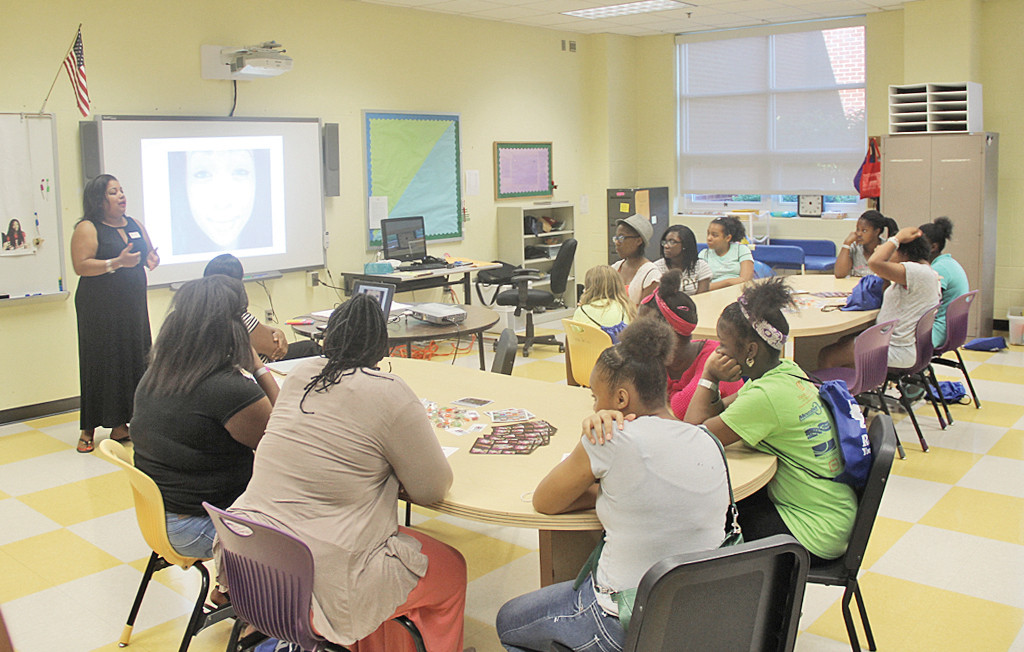
by Bianca Moorman
Students, parents and community leaders gathered at Patrick Henry High School August 1 to participate in Roanoke’s second annual Youth Summit. Attendance was light but the agenda was strong at this year’s event held by Roanoke Youth Services and Roanoke City Councilwoman Anita Price. The summit was for rising middle and high school students in the Roanoke Valley.
“We have discovered that we as adults don’t give our youth a chance to voice their opinions on things that relate to them,” said Councilwoman Price. In explaining why the summit is important she said,” It is our responsibility as adults to respond to our youth and to help them to grow, succeed and become the best citizens they can be.”
The various discussion panels lasted for about an hour and participants had a choice on which panel they would like to participate in based on their personal interests. Topics included, leadership, internet safety, “Help Save the Next Girl,” police and community relations, setting goals and preparing for college.

Trina Murphy, aunt of Alexis Murphy, led a panel that was geared towards sexual assault and violence. Murphy created the program called “Help Save the Next Girl,” designed to help prevent missing person cases like Alexis Murphy, Hannah Graham and Morgan Harrington from happening again.
Murphy said that such incidences involving abduction can happen to anyone and no one is too old to learn about the dangers of engaging with strangers. “I never talked to Alexis about being abducted because I thought that we were past that stage. We, as caring adults talk to little kids about being abducted.”
Because of her personal relationship to the issue, Murphy had a real and serious tone when she was addressing the students. “If your friend gets mad at you because they want to stay at the party and they never speak to you again guess what, at least they will be alive to never speak to you again.” She stressed the importance of when you are with your friends make sure to stay with your friends, leave with your friends and don’t leave your friends alone.
 She also talked about social media and the importance of “what we post online.” “Be very careful about who you talk to on social media because … you never know who you are communicating with,” Murphy said.
She also talked about social media and the importance of “what we post online.” “Be very careful about who you talk to on social media because … you never know who you are communicating with,” Murphy said.
Help Save the Next Girl has chapters across the country with the closes located at Virginia Tech. Their funding mostly goes to education. From the work that they have done, there is now a law that says that campus police have to report a sexual assault.
Murphy hoped that after the panel the students could take something away and become more aware of their surroundings.
In a panel about internet safety the main issue discussed was how youth are using the internet and social media in their everyday lives. “We live in a world that is going to be a challenge and as parents, you need to find out as much as possible,” said Nancy Hans, director of the Roanoke County Prevention Council.
Children are beginning to use technology at a younger age and studies by Virginia Tech Carilion Research Institute show technology is re-wiring the brains of youth. “The biggest concern that I have is with elementary school parents letting kids have more devices and apps than they should have. “In my opinion, elementary students do not need a smartphone or an iPad,” said Hans. Nonetheless, she said, “kids don’t want to wait…they want what they want then and now.” Hans also said that it is okay for parents to tell their kids no.
Taylor Powell, a rising senior at Cave Spring High School, has been with the Prevention Council of Roanoke County for the past two years and talked about her experience with social media.
“I didn’t get a Facebook account until I was 15… and was aggravated in the process,” said Powell.
The use of social media can be hard for girls because it affects their self-esteem particularly if they use social media at an early age. Hans gave an example of girls using Instagram in elementary school and how ‘likes’ (positive internet responses) directly correspond with self-esteem issues going into middle school.
Parents mostly talked about how their children use technology. One parent expressed worries about her child watching videos of people playing Minecraft, an online game with hidden levels of complexity.
“Facebook allows anyone 13 or older to sign up and many parents allow their kids to lie so they can get connected,” said Hans.
At another panel focused on leadership, students watched a video and from that video they picked out traits of a leader and traits of not being a leader.
The day rounded out with free food, a live DJ, a bounce house and a drawing for door prizes. In the future Councilwoman Price said, she would like to arrange smaller discussion groups around the city, so the voices of youth can be heard.




